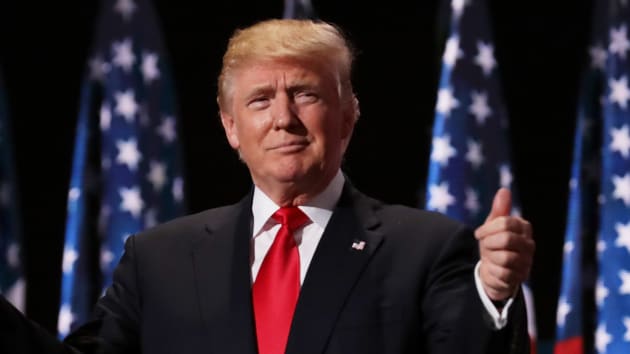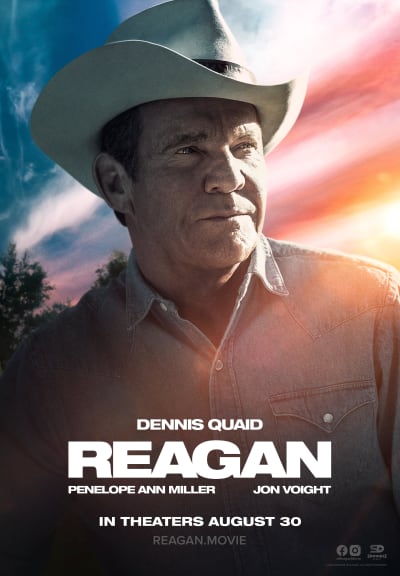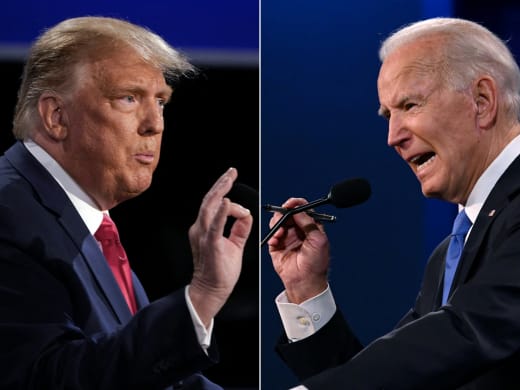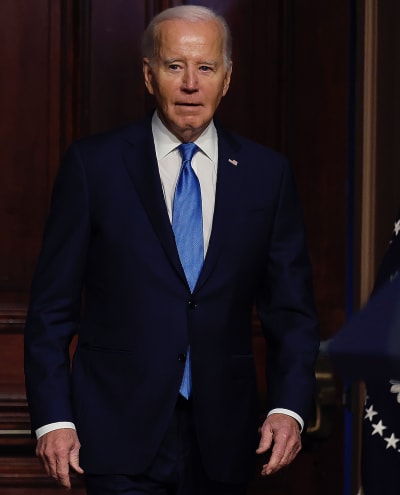As the competition series that revived the career and public image of Donald Trump, The Apprentice might be the most impactful — and infamous — reality show in TV history.
Seventeen years after it wrapped up its original run, the NBC series still occupies a surprisingly large place in our national consciousness.
In fact, it’s the basis for an upcoming book by Variety co-editor-in-chief Ramin Setoodeh and a new movie from director Ali Abbasi.
The book will be available on June 18, and the movie will be in a theater near you on — well, that’s not quite clear.
You see, Abbasi’s film — aptly titled The Apprentice — has yet to secure a distribution deal in the US.
With hot-button subject matter and an all-star cast that includes Sebastian Stan as Trump and Succession‘s Jeremy Strong as the infamous McCarthyite attorney Roy Cohn, it’s the sort of film that might’ve found itself at the center of a furious bidding war in an earlier era.
At the very least, it would’ve secured distribution in time to be released ahead of the November election, an occurrence that Abbasi has described as a free “promotional event.”
But for a number of complex reasons, The Apprentice might never see theaters at all, and it might not be available on streaming until after the votes are cast.
The Trend Toward Ideological Timidity
First, there’s the fact that the film was partially funded by pro-Trump billionaire (and former Washington Commanders owner) Dan Snyder, who reportedly thought he was paying to produce a movie that would portray his candidate in a positive light.
Any distribution sales would have to be approved by Snyder, who will likely opt to sit on his hands until after the 2024 election is definitively decided (whenever that might be).
Related: The Age of Nostalgia: Why Young Audiences Are Seeking Out Old TV
But while that particular hurdle may be unique to The Apprentice, the movie’s struggles speak to a larger problem in American culture right now:
It’s harder than ever for topical political art to find a mainstream audience.
Even though we’re living in an absolutely wild time in which the day’s headlines feel like something out of a reality show or a speculative novel that takes place in a dystopian future, no explicitly political filmmaker along the lines of Oliver Stone has emerged as the voice of America’s younger generations.
A Bipartisan Phenomenon
On the opposite side of the aisle, we have a new biopic about Ronald Reagan that’s set to hit theaters in August.
The film features a number of household names, including Dennis Quaid as the Great Communicator himself and Penelope Ann Miller as Nancy Reagan.
But with a shoestring budget provided by little-known indie outlet MJM Entertainment and distribution by the equally obscure ShowBiz Direct, it seems unlikely that the film will enjoy major box office success — or that it will come to be regarded as one of the great presidential biopics.
It’s strange that at a time when Americans are so invested in — some might even say obsessed with — their own political views, there are so few films or TV shows about the current goings-on in Washington.
Of course, those two phenomena might go hand-in-hand:
It’s possible that we get so much political content from our social media newsfeeds that the last thing we want to do on a Friday night is plunk down our hard-earned cash to see a movie about a recent president.
Or it might be that Americans are so divided these days that studio and network execs have simply given up on the possibility of producing another All the President’s Men or even an acclaimed miniseries along the lines of HBO‘s John Adams.
After all, when you’re in the midst of a cultural civil war, any film with a perceived political agenda is likely to be dismissed out of hand by at least half of the population.
Related: Suits, Ted Lasso, and the Rise of Comfort TV: Is the Desire For Easy Viewing Creating a Barren Streaming Landscape?
(Interestingly, the recent Alex Garland film Civil War mostly steered clear of explicit political statements, a decision that offered a sort of meta-commentary on our contentious times.)
If there’s little demand for political films, then it makes sense that the supply would diminish.
Obviously, now seems like an ideal time for a theatrical release along the lines of Steven Spielberg’s Lincoln — a film that might serve to remind Americans of the history and philosophical foundations that unite us all.
But Hollywood’s not in the business of making movies out of a sense of patriotic duty, so we’re not expecting the studios to dive back into an uncertain market simply because they feel obliged to do so.
However, there is a demand for balanced, thorough, and objective news coverage of the current election, and many social media users have complained that that’s shockingly hard to come by these days.
On that score, it is fair to demand that networks uphold their commitment to the nation.
The Anchor’s Obligation
In the days of Walter Cronkite and Edward R. Murrow up through the era of Tom Brokaw and Dan Rather, the news was a loss leader.
Networks didn’t expect to make money from it, they just wanted to play their part in informing the electorate (and build up the prestige of their brand in the process).
But once the profit motive was introduced to that sector, and the news became a 24-hour business, ethics and objectivity took a backseat to ratings.
These days, the cable news networks have made a business out of pandering to their respective bases, while more mainstream outlets such as NBC, CBS, and ABC seem terrified of alienating their audience with political coverage that depicts either side in a negative light.
Usually, in the summer before an election year, national news anchors seem interested in little else.
But in the bizarre year of our lord 2024, poor Lester Holt is forced to lead his nightly broadcast with coverage of the latest tornado-related disaster.
And while we feel for the unfortunate folks in those Oklahoma trailers, the real loser in this situation is the American voter.
What do you think, TV fanatics? Is the media letting us down ahead of this all-important election?
Hit the comments section below to share your thoughts.
Tyler Johnson is an Associate Editor for TV Fanatic and the other Mediavine O&O sites. In his spare time, he enjoys reading, cooking, and, of course, watching TV. You can Follow him on X and email him here at TV Fanatic.






